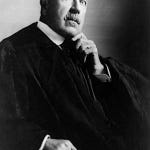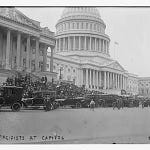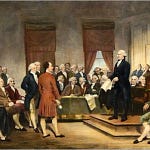This Day in Legal History: Paris Peace Conference
On this day, January 18, in 1919, a significant chapter in international legal and political history began with the opening of the Paris Peace Conference at Versailles, France. This conference, convened in the aftermath of World War I, was a monumental gathering of the victorious Allied Powers, setting the stage for negotiations that would profoundly reshape the geopolitical landscape of Europe and lay the groundwork for modern international law.
Over six months of intense deliberations followed, marking one of the longest and most complex diplomatic events in history. The primary objective was to establish a lasting peace and prevent the recurrence of such a devastating conflict. The leaders of the 'Big Four' – Woodrow Wilson of the United States, David Lloyd George of the United Kingdom, Georges Clemenceau of France, and Vittorio Emanuele Orlando of Italy – played pivotal roles in shaping the Treaty of Versailles.
The Treaty of Versailles, signed on June 28, 1919, dramatically redrew the borders of Europe. It imposed severe reparations and territorial losses on Germany, an aspect later criticized for possibly sowing the seeds of World War II. The treaty also resulted in the disbandment of empires, the creation of new nations, and significant territorial adjustments.
A landmark outcome of the conference was the establishment of the League of Nations, an intergovernmental organization aimed at ensuring world peace and cooperation. Although the League ultimately failed to prevent another world war, it represented a groundbreaking step towards the development of international organizations and international law.
The Paris Peace Conference and the Treaty of Versailles had far-reaching legal implications. They introduced principles of self-determination, held nations accountable for aggression, and set precedents for international diplomacy and conflict resolution. While the conference's decisions were controversial and its impacts debated for decades, its role in shaping the 20th-century legal and political order remains undeniable.
On this day, as we reflect on the 105th anniversary of the Paris Peace Conference, we recognize the complex legacy of these efforts to create a lasting peace and their profound impact on international law and global relations.
Meta Platforms Inc., the parent company of Facebook, is likely to face additional claims in a lawsuit concerning its Facebook "pixel" tracking tool. This tool is alleged to have violated the health-care privacy of millions by tracking and sharing protected health information without consent. The plaintiffs, anonymous Facebook users from various U.S. states, argue that Meta encouraged health-care providers to install the pixel on their websites, thereby violating federal and state laws. The tool reportedly matches collected information with Facebook user IDs for targeted advertising.
Judge William H. Orrick of the US District Court for the Northern District of California found the plaintiffs' invasion of privacy claims under the California Constitution and common law to be plausible, considering the privileged relationship between patients and health-care providers. He also acknowledged potential injuries related to common law trespass to chattels and violation of the California Computer Data Access and Fraud Act.
In a previous ruling, Orrick had dismissed several claims in the plaintiffs' original complaint but rejected Meta's motion to dismiss five other claims. These included breach of contract, breach of the duty of good faith and fair dealing, unjust enrichment, and violations of specific privacy acts.
During a hearing on Meta's motion to dismiss the amended complaint, Meta's attorney argued that the content of the plaintiffs' website searches did not reveal sensitive health information sufficient for an invasion of privacy claim. This was based on a Ninth Circuit ruling in a similar case. However, the plaintiffs' attorney countered, citing the Federal Trade Commission's broader definition of health information, which includes data that can infer a consumer's health status.
Furthermore, Meta's attorney argued that the intrusion by the Facebook pixel was not significant enough to support the plaintiffs' trespass claims, stating that the alleged harms were minimal. Conversely, the plaintiffs' attorney maintained that under California law, any measurable harm to a computer system can be grounds for a compensable trespass injury, as demonstrated in previous legal cases.
The lawsuit, representing a proposed class, includes several law firms on both sides. The case, In re Meta Pixel Healthcare Litigation, continues in the Northern District of California, with ongoing debates over the scope and nature of the alleged privacy violations and damages.
Meta Likely to Face Additional Claims in Pixel Health-Care Suit
The Maine State Superior Court has delayed a decision regarding former U.S. President Donald Trump's eligibility for the state's Republican primary ballot, pending a ruling by the U.S. Supreme Court on a similar case in Colorado. The court's directive, issued by Judge Michaela Murphy, orders Maine Secretary of State Shenna Bellows to reassess her decision to disqualify Trump within 30 days following the Supreme Court's verdict.
Bellows, a Democrat, had determined in December that Trump was ineligible to hold office under a U.S. Constitution provision barring individuals who have engaged in "insurrection or rebellion" from holding office. This decision was based on the allegation that Trump incited an insurrection in an attempt to retain power following his defeat in the 2020 election, highlighted by the January 6, 2021, attack on the U.S. Capitol.
Trump's spokesperson criticized the disqualification as a "bad-faith sham," while Trump himself appealed the ruling, arguing that Bellows was biased and that he was denied a fair opportunity to defend himself. He has consistently denied engaging in insurrection.
The upcoming Supreme Court ruling, with oral arguments scheduled for February 8, is expected to be politically significant. It could potentially clarify the role of state officials and courts in handling ballot challenges under the U.S. Constitution and might resolve the issue nationwide.
Maine and Colorado are currently the only states to have disqualified Trump under Section 3 of the 14th Amendment. Courts and election officials in several other states have rejected similar challenges to Trump's candidacy. Proponents of Trump's disqualification argue that enforcing the constitutional provision supports democratic values, while Trump and his supporters view these efforts as undemocratic election interference. Maine's primary is set for March 5, adding urgency to the Supreme Court's impending decision.
Maine court puts Trump ballot decision on hold until after Supreme Court acts | Reuters
The U.S. Justice Department is set to release a report on the delayed police response to the 2022 Uvalde, Texas school shooting, which resulted in the deaths of 19 children and two teachers. Initiated at the request of Uvalde’s mayor just days after the tragedy at Robb Elementary School, this report is part of the department's "Critical Incident Review." The police response faced severe criticism for the officers' prolonged wait in a hallway while the gunman was active in a classroom, despite receiving desperate 911 calls from students.
In July 2022, a report by Texas lawmakers described an "atmosphere of chaos" at the scene and criticized law enforcement for not prioritizing the lives of victims. The Justice Department's review, led by the Office of Community Oriented Policing Services with support from external experts in emergency management and school safety, aims to provide an independent analysis and draw lessons for future mass shooting responses.
Attorney General Merrick Garland and other top Justice Department officials visited Uvalde on Wednesday, touring a mural memorializing the victims ahead of the report's release. This report is expected to shed light on the law enforcement actions during the shooting and offer insights for handling similar incidents in the future.
US Justice Dept to release report on Uvalde school shooting response | Reuters
Apple Inc. announced that it will remove the blood oxygen monitoring feature from two of its flagship Apple Watch models in the U.S., the Series 9 and Ultra 2, as a result of an ongoing legal battle over patent infringement with medical technology company Masimo. This decision comes after the U.S. Court of Appeals for the Federal Circuit ruled against Apple selling these models. The issue stemmed from a December decision by the U.S. International Trade Commission (ITC), which ordered a halt to the imports of the devices following a complaint by Masimo.
Masimo accused Apple of stealing its pulse oximetry technology and poaching its employees to use in Apple Watches. The ITC initially imposed an import ban on the affected Apple Watch models, but the Federal Circuit briefly lifted this ban while considering Apple's request for a long-term pause. Apple resumed sales of the smartwatches shortly after the temporary lift of the ban.
Apple has expressed strong disagreement with the ITC's decision and is seeking to reverse it. Meanwhile, existing Apple Watches and devices sold outside the United States are not affected by the order. The Series 9 and Ultra 2 models sold in the U.S. from Thursday will still display an app icon for the blood oxygen features, but upon accessing, users will be informed that the feature is unavailable.
The legal dispute is expected to take months to resolve, during which time Apple has requested the ban be kept on hold. The company argues that maintaining the ban would harm not only Apple but also its suppliers and the public. Apple's wearables, home, and accessory segment, which includes the Apple Watch, is a significant part of its revenue, making the outcome of this legal battle crucial for the company.
Apple to sell some watches without blood oxygen feature after US court ruling | Reuters













